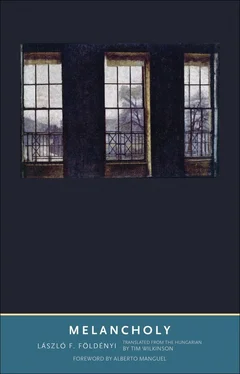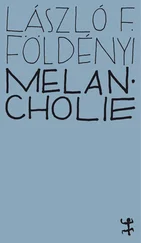Melancholics thus gradually became creators, and melancholia became a source of imagination (already in the fourteenth century, the French poet Eustache Deschamps declared in speaking about a repugnant matter: no single artist was sufficiently melancholic to be able to paint it, that is, it surpassed all the powers of imagination), and a manifestation of genius . This was an age of a rebirth of Aristotle’s concept of melancholia: once again it became the distinguishing mark of outstanding people. In the Middle Ages there existed just one creator, God, and the notion of a genius who is a creature was unknown. The word “genius,” which originally denoted begetting, bringing into being (  ), is connected with God’s manifestation in the New Testament, relating to the start of Jesus’s functions on Earth (Hebrews 1:5), 27his connection with God (Luke 3:22), 28and his resurrection (Acts 13:33). 29The original “genius” was the due of God alone, and, since his will is omnipotent, genius (that is, begetting and creation) in the final analysis was not the bringing of something new into being, but was always a fulfillment of the existing order, an honoring of the divine will, as the Gospel of Matthew preaches (“Thy will be done,” using the passive voice of the verb
), is connected with God’s manifestation in the New Testament, relating to the start of Jesus’s functions on Earth (Hebrews 1:5), 27his connection with God (Luke 3:22), 28and his resurrection (Acts 13:33). 29The original “genius” was the due of God alone, and, since his will is omnipotent, genius (that is, begetting and creation) in the final analysis was not the bringing of something new into being, but was always a fulfillment of the existing order, an honoring of the divine will, as the Gospel of Matthew preaches (“Thy will be done,” using the passive voice of the verb  , “to give birth, to come into being”:
, “to give birth, to come into being”:  (Matthew 6:10). There is no room for individual genius in this context — it will acquire a role only when divine omnipotence starts to crumble and the cracks have to be filled by the creative force of the individual creature. People are left to themselves (they are microcosms, as Cusanus puts it) and become creative forces in the manner of god. The genius of melancholics was of divine origin, Ficino taught — but the genius here was the escorting angel of individual and antimetaphysical exertions. Genius, which initially adopted the form of an independent being and thus assisted (or thwarted) humans in creating a great work, during the sixteenth century lost its independence and became identical with a person’s creative power; it lost its autonomous, metaphysical reference, which was independent of humans, and began to transform itself into a secular figure. Humans became endowed with genius but were incapable of avoiding the obstacles to the act of creation: as has been seen, the desire for absolute autonomy leads directly to the recognition of the inability to fulfill that desire —one has a simultaneous perception of self-mastery and utter vulnerability. The source of the melancholia of genius is helplessness: melancholics do not know who is putting their life and work at risk, but since they see that no one is lording it over them, they can conclude only that the danger, their ultimate inability to move, originates in themselves: they are their own worst enemies. Writing about the spirit working in humans, Joseph Scaliger took the view: “There are certain divine geniuses that we can neither see nor hear, but they manifest and settle in a person in such a manner that they illuminate with their light the secret things about which we write. That is why it is that when this heavenly incandescence cools in us often we are astonished at our own words and do not recognize them. Often we don’t even understand them in the sense in which the genius dictated them” (quoted in Edgar Zilsel, Die Entstehung der Geniebegriffs , 284). Scaliger calls these geniuses benevolent, but it is questionable whether they are harmful from the creator’s point of view. Because genius foists irresolvable contradictions on those who accept their own abilities and wish to exploit their own opportunities: they are forced to recognize both that everything they do bears their own imprint, yet they have only partially to do with the whole thing. A genius is at the mercy of himself —if he submits to that vulnerability, he has to give up on himself; if not, then he must still give up on being himself. He constantly, at every moment, endangers himself and keeps falling, spiraling down to ever-greater depths. He is not threatened by an external enemy, which is why he is unable even to defend himself. And what to an outsider appears to be creativity is in fact an internal rumination. True genius destroys itself — it is obliged to league with death. Genius leads man to the very brink of death, and vice versa: he who arrives at the brink of death is separated only by a hair’s breadth from genius. “It’s hard to die,” Ernst Jünger wrote in the twentieth century, “yet one succeeds all the same. In this everyone still proved to be a genius” (Jünger, “Drugs and Ecstasy,” in Myth and Symbols , ed. Joseph M. Kitagawa and Charles H. Long). Death is the better part of genius. The strong inclination of melancholics to suicide is a struggle between life and death in the most profound sense (the outcome, of course, is decided from the start). Genius is a manifestation of the tension between creativity and death — without that tension, however, there would be no “poles” either. The supplanting of the genius of God by individual genius is inconceivable without a not necessarily consciously felt sympathy for death; 30yet facing up to death, the nonrecurrence and irreplaceability of existence, likewise makes geniuses of those who are willing to relate this to their own fate and conduct of life. That would become entirely true only during the period of Romanticism, but one can recognize the forerunners of the Romantics in the portrait figures of the Italian Renaissance, in the Arnolfini couple, in the protagonists of Elizabethan and Jacobean tragedies, and, not least, in the eccentric, melancholic artists of the Renaissance.
(Matthew 6:10). There is no room for individual genius in this context — it will acquire a role only when divine omnipotence starts to crumble and the cracks have to be filled by the creative force of the individual creature. People are left to themselves (they are microcosms, as Cusanus puts it) and become creative forces in the manner of god. The genius of melancholics was of divine origin, Ficino taught — but the genius here was the escorting angel of individual and antimetaphysical exertions. Genius, which initially adopted the form of an independent being and thus assisted (or thwarted) humans in creating a great work, during the sixteenth century lost its independence and became identical with a person’s creative power; it lost its autonomous, metaphysical reference, which was independent of humans, and began to transform itself into a secular figure. Humans became endowed with genius but were incapable of avoiding the obstacles to the act of creation: as has been seen, the desire for absolute autonomy leads directly to the recognition of the inability to fulfill that desire —one has a simultaneous perception of self-mastery and utter vulnerability. The source of the melancholia of genius is helplessness: melancholics do not know who is putting their life and work at risk, but since they see that no one is lording it over them, they can conclude only that the danger, their ultimate inability to move, originates in themselves: they are their own worst enemies. Writing about the spirit working in humans, Joseph Scaliger took the view: “There are certain divine geniuses that we can neither see nor hear, but they manifest and settle in a person in such a manner that they illuminate with their light the secret things about which we write. That is why it is that when this heavenly incandescence cools in us often we are astonished at our own words and do not recognize them. Often we don’t even understand them in the sense in which the genius dictated them” (quoted in Edgar Zilsel, Die Entstehung der Geniebegriffs , 284). Scaliger calls these geniuses benevolent, but it is questionable whether they are harmful from the creator’s point of view. Because genius foists irresolvable contradictions on those who accept their own abilities and wish to exploit their own opportunities: they are forced to recognize both that everything they do bears their own imprint, yet they have only partially to do with the whole thing. A genius is at the mercy of himself —if he submits to that vulnerability, he has to give up on himself; if not, then he must still give up on being himself. He constantly, at every moment, endangers himself and keeps falling, spiraling down to ever-greater depths. He is not threatened by an external enemy, which is why he is unable even to defend himself. And what to an outsider appears to be creativity is in fact an internal rumination. True genius destroys itself — it is obliged to league with death. Genius leads man to the very brink of death, and vice versa: he who arrives at the brink of death is separated only by a hair’s breadth from genius. “It’s hard to die,” Ernst Jünger wrote in the twentieth century, “yet one succeeds all the same. In this everyone still proved to be a genius” (Jünger, “Drugs and Ecstasy,” in Myth and Symbols , ed. Joseph M. Kitagawa and Charles H. Long). Death is the better part of genius. The strong inclination of melancholics to suicide is a struggle between life and death in the most profound sense (the outcome, of course, is decided from the start). Genius is a manifestation of the tension between creativity and death — without that tension, however, there would be no “poles” either. The supplanting of the genius of God by individual genius is inconceivable without a not necessarily consciously felt sympathy for death; 30yet facing up to death, the nonrecurrence and irreplaceability of existence, likewise makes geniuses of those who are willing to relate this to their own fate and conduct of life. That would become entirely true only during the period of Romanticism, but one can recognize the forerunners of the Romantics in the portrait figures of the Italian Renaissance, in the Arnolfini couple, in the protagonists of Elizabethan and Jacobean tragedies, and, not least, in the eccentric, melancholic artists of the Renaissance.
Notions formed in the Renaissance have affected our picture of melancholia down to the present day. Sadness and deep thinking are its most characteristic manifestations: melancholia is both an explanation of being that lays a claim to general validity and an individual disposition, an ultimate source of our judging the world and a sheer mood. 1After the Renaissance, the individual related the world exclusively to himself, and he fell irretrievably into a trap not known to either the Middle Ages or antiquity: the pitfall of the contradiction of indefinable infinity and concrete individuality . Antiquity did not concern itself with infinity from the point of view of the individual (infinity was undeterminable and therefore not a positive quantity; in his Metaphysics , Aristotle holds it to be inconceivable that human thinking would be able to reach, via causes and effects, as far as indeterminability, which was therefore considered an imperfection from the viewpoint of human understanding [ Metaphysics , bk. 2, 2, 994b]. In the Physics , by contrast, he compares the infinite with the whole: “A quantity is infinite if it is such that we can always take a part outside what has been already taken. . The whole is that of which nothing is outside. On the other hand that from which something is absent and outside, however small that may be, is not ‘all’” [ Physics , bk. 3, ch. 6, 207a]). Christianity, on the other hand, while relating infinity to the individual, did not regard it as undetermined. (St. Gregory of Nyssa was the first to look on the infinity of God as a positive quantity, considering it possible that a creature’s existence could become adjacent to God.) Concrete individuality and infinity regarded as positive first appeared as a paradox in the Renaissance era; it was to the credit of melancholics of the age that by consistently thinking and living through it , they came to realize its irresolvability. Individuals, as a result of their uniqueness and unrepeatability, are closed, one-time, limited beings, but precisely because of their complete isolation and point-like enclosure, they come to realize with astonishment their own inner infinitude. Their life is unrepeatable; no external standard is to be found against which to measure themselves, and therefore they will be standards for the world. Closedness and openness, finitude and infinitude, are characteristic of one and the same personality, and although the emphases may have changed, this remains true to the present day.
Читать дальше

 ), is connected with God’s manifestation in the New Testament, relating to the start of Jesus’s functions on Earth (Hebrews 1:5), 27his connection with God (Luke 3:22), 28and his resurrection (Acts 13:33). 29The original “genius” was the due of God alone, and, since his will is omnipotent, genius (that is, begetting and creation) in the final analysis was not the bringing of something new into being, but was always a fulfillment of the existing order, an honoring of the divine will, as the Gospel of Matthew preaches (“Thy will be done,” using the passive voice of the verb
), is connected with God’s manifestation in the New Testament, relating to the start of Jesus’s functions on Earth (Hebrews 1:5), 27his connection with God (Luke 3:22), 28and his resurrection (Acts 13:33). 29The original “genius” was the due of God alone, and, since his will is omnipotent, genius (that is, begetting and creation) in the final analysis was not the bringing of something new into being, but was always a fulfillment of the existing order, an honoring of the divine will, as the Gospel of Matthew preaches (“Thy will be done,” using the passive voice of the verb  , “to give birth, to come into being”:
, “to give birth, to come into being”:  (Matthew 6:10). There is no room for individual genius in this context — it will acquire a role only when divine omnipotence starts to crumble and the cracks have to be filled by the creative force of the individual creature. People are left to themselves (they are microcosms, as Cusanus puts it) and become creative forces in the manner of god. The genius of melancholics was of divine origin, Ficino taught — but the genius here was the escorting angel of individual and antimetaphysical exertions. Genius, which initially adopted the form of an independent being and thus assisted (or thwarted) humans in creating a great work, during the sixteenth century lost its independence and became identical with a person’s creative power; it lost its autonomous, metaphysical reference, which was independent of humans, and began to transform itself into a secular figure. Humans became endowed with genius but were incapable of avoiding the obstacles to the act of creation: as has been seen, the desire for absolute autonomy leads directly to the recognition of the inability to fulfill that desire —one has a simultaneous perception of self-mastery and utter vulnerability. The source of the melancholia of genius is helplessness: melancholics do not know who is putting their life and work at risk, but since they see that no one is lording it over them, they can conclude only that the danger, their ultimate inability to move, originates in themselves: they are their own worst enemies. Writing about the spirit working in humans, Joseph Scaliger took the view: “There are certain divine geniuses that we can neither see nor hear, but they manifest and settle in a person in such a manner that they illuminate with their light the secret things about which we write. That is why it is that when this heavenly incandescence cools in us often we are astonished at our own words and do not recognize them. Often we don’t even understand them in the sense in which the genius dictated them” (quoted in Edgar Zilsel, Die Entstehung der Geniebegriffs , 284). Scaliger calls these geniuses benevolent, but it is questionable whether they are harmful from the creator’s point of view. Because genius foists irresolvable contradictions on those who accept their own abilities and wish to exploit their own opportunities: they are forced to recognize both that everything they do bears their own imprint, yet they have only partially to do with the whole thing. A genius is at the mercy of himself —if he submits to that vulnerability, he has to give up on himself; if not, then he must still give up on being himself. He constantly, at every moment, endangers himself and keeps falling, spiraling down to ever-greater depths. He is not threatened by an external enemy, which is why he is unable even to defend himself. And what to an outsider appears to be creativity is in fact an internal rumination. True genius destroys itself — it is obliged to league with death. Genius leads man to the very brink of death, and vice versa: he who arrives at the brink of death is separated only by a hair’s breadth from genius. “It’s hard to die,” Ernst Jünger wrote in the twentieth century, “yet one succeeds all the same. In this everyone still proved to be a genius” (Jünger, “Drugs and Ecstasy,” in Myth and Symbols , ed. Joseph M. Kitagawa and Charles H. Long). Death is the better part of genius. The strong inclination of melancholics to suicide is a struggle between life and death in the most profound sense (the outcome, of course, is decided from the start). Genius is a manifestation of the tension between creativity and death — without that tension, however, there would be no “poles” either. The supplanting of the genius of God by individual genius is inconceivable without a not necessarily consciously felt sympathy for death; 30yet facing up to death, the nonrecurrence and irreplaceability of existence, likewise makes geniuses of those who are willing to relate this to their own fate and conduct of life. That would become entirely true only during the period of Romanticism, but one can recognize the forerunners of the Romantics in the portrait figures of the Italian Renaissance, in the Arnolfini couple, in the protagonists of Elizabethan and Jacobean tragedies, and, not least, in the eccentric, melancholic artists of the Renaissance.
(Matthew 6:10). There is no room for individual genius in this context — it will acquire a role only when divine omnipotence starts to crumble and the cracks have to be filled by the creative force of the individual creature. People are left to themselves (they are microcosms, as Cusanus puts it) and become creative forces in the manner of god. The genius of melancholics was of divine origin, Ficino taught — but the genius here was the escorting angel of individual and antimetaphysical exertions. Genius, which initially adopted the form of an independent being and thus assisted (or thwarted) humans in creating a great work, during the sixteenth century lost its independence and became identical with a person’s creative power; it lost its autonomous, metaphysical reference, which was independent of humans, and began to transform itself into a secular figure. Humans became endowed with genius but were incapable of avoiding the obstacles to the act of creation: as has been seen, the desire for absolute autonomy leads directly to the recognition of the inability to fulfill that desire —one has a simultaneous perception of self-mastery and utter vulnerability. The source of the melancholia of genius is helplessness: melancholics do not know who is putting their life and work at risk, but since they see that no one is lording it over them, they can conclude only that the danger, their ultimate inability to move, originates in themselves: they are their own worst enemies. Writing about the spirit working in humans, Joseph Scaliger took the view: “There are certain divine geniuses that we can neither see nor hear, but they manifest and settle in a person in such a manner that they illuminate with their light the secret things about which we write. That is why it is that when this heavenly incandescence cools in us often we are astonished at our own words and do not recognize them. Often we don’t even understand them in the sense in which the genius dictated them” (quoted in Edgar Zilsel, Die Entstehung der Geniebegriffs , 284). Scaliger calls these geniuses benevolent, but it is questionable whether they are harmful from the creator’s point of view. Because genius foists irresolvable contradictions on those who accept their own abilities and wish to exploit their own opportunities: they are forced to recognize both that everything they do bears their own imprint, yet they have only partially to do with the whole thing. A genius is at the mercy of himself —if he submits to that vulnerability, he has to give up on himself; if not, then he must still give up on being himself. He constantly, at every moment, endangers himself and keeps falling, spiraling down to ever-greater depths. He is not threatened by an external enemy, which is why he is unable even to defend himself. And what to an outsider appears to be creativity is in fact an internal rumination. True genius destroys itself — it is obliged to league with death. Genius leads man to the very brink of death, and vice versa: he who arrives at the brink of death is separated only by a hair’s breadth from genius. “It’s hard to die,” Ernst Jünger wrote in the twentieth century, “yet one succeeds all the same. In this everyone still proved to be a genius” (Jünger, “Drugs and Ecstasy,” in Myth and Symbols , ed. Joseph M. Kitagawa and Charles H. Long). Death is the better part of genius. The strong inclination of melancholics to suicide is a struggle between life and death in the most profound sense (the outcome, of course, is decided from the start). Genius is a manifestation of the tension between creativity and death — without that tension, however, there would be no “poles” either. The supplanting of the genius of God by individual genius is inconceivable without a not necessarily consciously felt sympathy for death; 30yet facing up to death, the nonrecurrence and irreplaceability of existence, likewise makes geniuses of those who are willing to relate this to their own fate and conduct of life. That would become entirely true only during the period of Romanticism, but one can recognize the forerunners of the Romantics in the portrait figures of the Italian Renaissance, in the Arnolfini couple, in the protagonists of Elizabethan and Jacobean tragedies, and, not least, in the eccentric, melancholic artists of the Renaissance.










